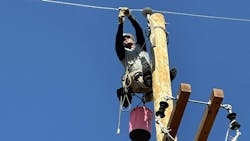The Life of a Lineworker: A Journey of Hard Work and Dedication
-
Is a third-year apprentice lineworker.
-
Married to his wife, Kara, and they have a two-year-old son named Bryce.
-
Enjoys running and working out with his wife and spending time with his son.
-
Completed a pre-apprenticeship program prior to getting hired on by Duke Energy.
-
Says all the new power tools make his job easier than it used to be with a lot of hand tools. Cutters and presses now take a push of the finger rather than a lot of effort.
-
Safety is a big focus in today’s utility industry, which he says is a good thing for apprentices learning the trade.
-
In the future, he sees a continued progression in tools to make jobs safer for lineworkers.
Inspiration for Going into Line Work
I had family friends in the trade. I wanted a good career that worked outdoors. I’m the first one from my family to do line work.
Training in the Trade
I’m a third-year apprentice, and our apprenticeship is a total of four years. My local yard has poles to climb and we also have a main training facility that has a training field and hot room set up. Most of our training is on the job, but once a year we go to our main training center for a school. We also have to “test out” in front of trainers doing specific tasks to determine if we are allowed to advance to the next level.
On the Job
I work on a crew of six guys. Our day varies based on what work we are given. We do pole change outs and new installs. The crew works together regardless of status as an apprentice or lineman. Based on what year you are in your apprenticeship, you may be limited on what live voltages you can handle.
Challenges and Rewards of Line Work
I think some rules that are in place for apprentices can hold them back from learning. For example, some apprenticeships won’t allow the apprentice to handle primary voltage until a year-and-a-half into the apprenticeship. Apprentices may be doing a good job and may be ready to advance sooner but are limited by rules that are in place based on their time on and not their ability level. Every apprentice progresses at different time frames and the rules should mold around your ability level.
Working Storms
I’ve only worked local in-state storms. Generally, we work sixteens every day until the system is restored. We’ve had a few decent-sized tornado outbreaks that have caused a lot of damage. The crew just keeps taking tickets until the job is done.
Life in the Trade
I think it’s a great job. It’s a great combination of using your hands and using your brain. My favorite part is working outdoors every day.
Secrets for Success in an Apprenticeship
You have to be a hard worker. Everybody needs to do their part. Apprentices who want to learn and like to listen to instruction do well. Those who can’t take criticism and don’t put in effort do not do well. Attention to detail matters in this trade.
Advice to Other Apprentices
Make sure you actually want to do the job and aren’t just interested in money. You work in hazardous situations in the worst of weather conditions. It takes focus and effort to do the job safely. Listen to the lineworkers who have been doing the job for longer than you and don’t be a know-it-all.
Focusing on Safety
Our company takes safety very seriously. We cover up the right way and don’t take unnecessary risks. Safety is the most important thing in the trade. One moment of being careless can get you or others killed.
Future Plans
In the future, as a journeyman lineman, I need to continue learning and progressing in the line trade.
Editor’s Note: If you would like to nominate an apprentice for Faces of the Future, please email Field Editor Amy Fischbach at [email protected]. All profiled apprentice lineworkers will receive a tool package from Milwaukee Tool.
About the Author
Amy Fischbach
Electric Utilities Operations
Amy Fischbach is the Field Editor for T&D World magazine and manages the Electric Utility Operations section. She is the host of the Line Life Podcast, which celebrates the grit, courage and inspirational teamwork of the line trade. She also works on the annual Lineworker Supplement and the Vegetation Management Supplement as well as the Lineman Life and Lineman's Rodeo News enewsletters. Amy also covers events such as the Trees & Utilities conference and the International Lineman's Rodeo. She is the past president of the ASBPE Educational Foundation and ASBPE and earned her bachelor's and master's degrees in journalism from Kansas State University. She can be reached at [email protected].
